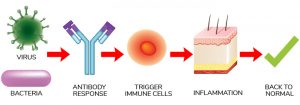How Can Dogs Acquire Immunity To Diseases?

Two ways that a dog can acquire immunity to diseases are:
Passive – usually from the placenta and also the early milk from their mother that contains colostrum. These give the puppy what is known as MDA, or maternally derived antibodies, and can help to protect the puppy for its first weeks of life – how long the MDAs last depend on the puppy and also on the specific antibodies – for example, the antibodies for parvo can last up to 26 weeks, whilst those for distemper generally last up to 12 weeks. It is possible to boost passive immunity by purchasing Transfer Factor, which contains colostrum from a nursing bitch – this is particularly useful if the mother doesn’t nurse for any reason, or does not contain the antibodies herself.
Active – either from coming into contact with the disease and building up their own immunity or from vaccinations. Note though, that vaccinations are injected straight into the blood stream, bypassing the first line of defence for dogs – their nasal passages with mucus that can often stop diseases before they even get to the body. An alternative to vaccinations is nosodes – research on these is limited (mainly as homeopathic vets refuse to test on animals, so the normal scientific testing and double-blind tests do not take place in the same way as with big pharmacy companies). Also, nosodes do not create antibodies in the same way as vaccinations, so they do not show up in titre tests.
